If you’re like me, you’ll do just about anything to keep your cat healthy and happy—including obsessing over what’s in their food. When I first started researching grain-free cat food for Luna, my overly dramatic (but adorable) tabby, I was overwhelmed by all the options. Every brand seemed to promise the moon: better digestion, shinier fur, fewer allergies. But which one was actually the best?

After a lot of trial and error (and some very judgmental looks from Luna), I finally found a few winners. If you’re thinking of making the switch to grain-free cat food, here’s what you need to know—and a few of the best options to try.
What is Grain-Free Cat Food, and Why Choose It?
Grain-free cat food skips ingredients like wheat, corn, and soy, which are often used as fillers in traditional pet foods. Instead, it focuses on protein-rich recipes that mimic what cats would naturally eat in the wild.

Benefits of Grain-Free Cat Food:
- Improved Digestion: Cats are obligate carnivores, meaning their bodies are built to thrive on meat, not grains.
- Allergy Relief: Some cats have sensitivities to grains, leading to itchy skin or upset stomachs.
- Shinier Coat: High-protein diets often include more omega-3s and omega-6s, which can make your cat’s fur soft and shiny.
Luna isn’t allergic to grains, but switching her to grain-free food noticeably boosted her energy and made her coat ridiculously silky. Plus, she seems to love the taste—no more stink-eye at mealtime!
What to Look for in the Best Grain-Free Cat Food

Not all grain-free options are created equal. Some brands swap grains for fillers like potatoes or peas, which aren’t much better. Here’s what to prioritize:
- High-Quality Protein: Meat should always be the first ingredient.
- No Fillers: Avoid foods with excessive starches like potato or tapioca.
- Healthy Fats: Look for omega-rich ingredients like fish oil or chicken fat.
- Taurine: An essential amino acid that cats need for heart and vision health.
Pro Tip: Always check the label. If the first few ingredients aren’t real, recognizable food, put it back on the shelf.
The Best Grain-Free Cat Foods (Luna-Approved)
After testing a range of brands, here are the ones that stood out—for both Luna’s palate and my peace of mind.
1. Orijen Cat & Kitten Grain-Free Dry Cat Food

- Why It’s Great: Orijen’s first five ingredients are fresh or raw animal protein, including chicken, turkey, and fish. It’s packed with 90% animal ingredients, mimicking a cat’s natural diet.
- Pros: High protein, no fillers, and tons of omega fatty acids for a shiny coat.
- Cons: It’s on the pricier side, but the quality justifies the cost.
- Luna’s Verdict: She devours it like it’s the best thing she’s ever eaten. Every. Single. Time.
2. Blue Buffalo Wilderness Grain-Free Dry Cat Food

- Why It’s Great: Blue Buffalo Wilderness uses deboned chicken as the first ingredient and skips fillers. It’s also fortified with vitamins, minerals, and taurine.
- Pros: Affordable, high protein, and includes LifeSource Bits (a mix of antioxidants and nutrients).
- Cons: Some cats aren’t fans of the crunchy LifeSource Bits.
- Luna’s Verdict: She eats around the LifeSource Bits, but overall, it’s a hit.
3. Wellness CORE Grain-Free Wet Cat Food

- Why It’s Great: This wet food is perfect for picky eaters or cats that need more moisture in their diet. It’s made with real meat, like turkey and chicken, and no artificial additives.
- Pros: High moisture content, great for hydration, and comes in a variety of flavors.
- Cons: Cans can be a bit messy to store once opened.
- Luna’s Verdict: She’s obsessed with the turkey and duck flavor—her bowl is licked clean in seconds.
4. Tiki Cat Born Carnivore Grain-Free Dry Cat Food

- Why It’s Great: Tiki Cat leans into a high-protein, low-carb formula with chicken as the first ingredient. It’s free of potatoes and other starchy fillers.
- Pros: Low-carb, high-quality ingredients, and great for weight management.
- Cons: The kibble pieces are small, which might not work for larger cats.
- Luna’s Verdict: She crunches through it happily but still demands wet food on the side (she’s fancy like that).
5. Merrick Purrfect Bistro Grain-Free Wet Cat Food
- Why It’s Great: Made with deboned meat and packed with essential vitamins and minerals, this wet food is both delicious and balanced.
- Pros: Affordable, high moisture, and easy to store in small cans.
- Cons: Stronger smell compared to other wet foods.
- Luna’s Verdict: The salmon flavor is her favorite—it’s her “special treat” on Sundays.
How to Transition Your Cat to Grain-Free Food

Switching to grain-free cat food? Don’t do it cold turkey (pun intended). Cats can be sensitive to dietary changes, so ease them in gradually:
- Mix a small amount of the new food with their current food.
- Gradually increase the new food over 7-10 days.
- Watch for any changes in digestion, stool consistency, or behavior.
Luna took to her new grain-free diet quickly, but every cat is different—patience is key.
Final Thoughts: Is Grain-Free Cat Food Right for Your Cat?
Not every cat needs a grain-free diet, but if your feline friend struggles with allergies, weight issues, or dull fur, it’s worth a try. For Luna, switching to grain-free cat food was a game-changer. She’s healthier, more active, and (dare I say) even more affectionate now that she’s eating what she loves.

Whether you choose Orijen’s premium dry food or Wellness CORE’s hydrating wet options, the best grain-free cat food is the one that makes both you and your cat happy. After all, a content cat is the ultimate reward for any pet parent.
Do you have a favorite grain-free brand? Or a picky eater like Luna? Share your stories—I’d love to hear about your feline adventures! 🐾



